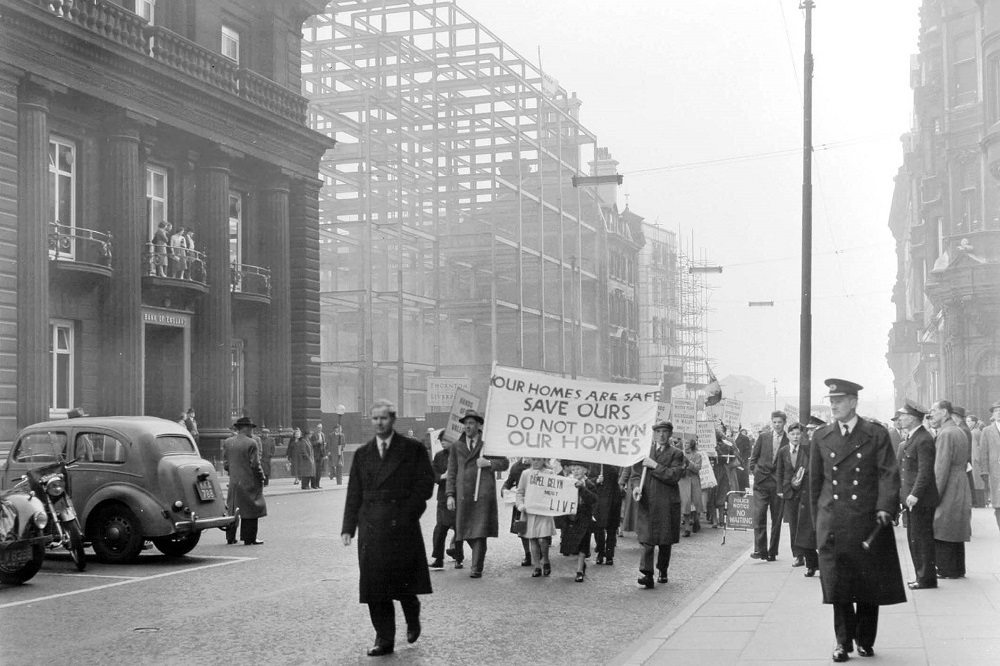The definitive book on Tryweryn has just been published

Martin Shipton
Wyn Thomas’ book Tryweryn: A New Dawn? is likely to become the definitive account of what has become one of the key touchstone points of Welsh history.
The drowning of the Tryweryn Valley and the village of Capel Celyn in the 1960s to provide water for Liverpool has come to symbolise the exploitation of Wales by its larger neighbour to the east and the sense of impotence in a country often subjected to the whims of a Conservative government at Westminster that it didn’t vote for.
Despite devolution, there have been echoes of such feelings recently as the UK Government has sought to grab back powers from the Senedd.
Many politicians, especially Plaid Cymru ones, have cited the injustice of Tryweryn as a significant factor in their original decision to stand for election.
For many, the image of a victimised Wales has a romantic appeal all of its own.
Thomas, however, took the view that much more analysis was required if an understanding of all the nuances of the Tryweryn scandal were to be deciphered.
Brought up in an English-speaking family in Llandrindod, Thomas developed a love of history at school, which gradually, thanks to an inspiring teacher, turned into a love of Welsh history. He has spent more than 20 years researching all aspects of the Tryweryn story, picking up a PhD along the way.
Dubious justification
Thomas said: “Two aspects of the Tryweryn story have attracted particular attention and comment in Wales: what is deemed to be Liverpool’s dubious justification for flooding Cwm Tryweryn and the traditional belief, often strenuously expressed, that the threatened Welsh-speaking community was united in opposing Liverpool’s reservoir construction project. In Tryweryn: A New Dawn? I challenge both of these deeply-held opinions. “The use of extensive archival testimony convincingly demonstrates that Liverpool’s need to construct a reservoir to combat the city’s municipal water and employment problem was real and genuine.
“As to the true extent of the cohesion felt by the threatened Welsh-speaking community in protesting against Liverpool’s actions, compelling evidence is presented in the book to challenge the existing legend, including giving an unprecedented voice to those from the former valley community who feel the time has come to put the record straight.”

Pushed about the Liverpool connection, Thomas said: “I do think that mistakes by Liverpool were made: the announcement by Liverpool that it intended to construct the reservoir, which the Cwm Tryweryn community first read about in their north Wales editions of the Liverpool Daily Post, just three days before Christmas in 1957. Also, the decision to hold a stylised ‘opening’ ceremony at Llyn Celyn in October 1965.
“The decision to hold such an unveiling ceremony all but confirmed to those opposed to the project that Liverpool had acted with disdain and arrogance throughout the entire period the Tryweryn project was undertaken.
“It’s also important to note that efforts were made by those in Wales opposed to the construction of the reservoir. Alternative reservoir project sites were suggested, which would have provided all the water Liverpool required for its domestic consumption needs, and much of its industrial water needs. Sites which were uninhabited for instance.
“Raising the dam wall at Llyn Vyrnwy was also suggested, so as to increase the catchment area. But for reasons of cost, or owing to attitudes which appear to have been hell-bent on achieving its aim of constructing a reservoir at Cwm Tryweryn, these alternative proposals were dismissed as ‘impractical’.
Thomas added: “I do think that subsequent events, where the much-heralded boom of industry on Merseyside did not happen, and the population of the city decreased significantly during the latter half of the 20th century, vindicate Welsh voices who opposed the valley’s flooding.
“They argued from the outset, having looked at the city’s water consumption figures, both domestic and industrial, that the water needs of Liverpool could be adequately met through the construction of a smaller reservoir in an unpopulated location – which, of course, would not have led to a Welsh-speaking community being removed.
“But importantly, Liverpool Corporation had to act on the advice of the city’s water engineer, John Stilgoe, who in the early and mid-1950s anticipated an increase in the city’s water needs. It also needs to be remembered that Liverpool had a commitment through the Lake Vyrnwy Act (1880) to provide water to neighbouring authorities.
“The money received from the water at Llyn Celyn was required to finance the rehousing reconstruction project, the removal of the slums and the building of alternative and better housing.
“But so too was the water required for existing industry and to attract industry to Merseyside and, therefore, employment to Liverpool and Merseyside. And I think the fact that this water was being provided for industry stuck most in the Welsh craw. It was suggested that the River Mersey could be used to this end, as the Thames was in London.”

Revaluation
Prior to writing the book, objective revaluation of this was required: “It is a complicated and emotive story,” said Thomas. “But the rehashing of rather tired arguments and attitudes didn’t really appeal to me. The history, I reasoned, required a fresh, impartial and dare I suggest, detached approach. And I must add, that as the research is very much evidence-led;, the project naturally took that course of direction anyway.
“The flooding of Cwm Tryweryn is an important event in the emergence of modern Wales and we need to have a better understanding of what happened – and why. And also, how best we can move on as a nation in the months and years ahead.
“What seems clear to me is that we need to have total and legal control of all our natural resources, which currently, under the present constitutional arrangement, we do not.”
Thomas concluded: “It would be churlish for me to deny that writing Tryweryn: A New Dawn? involved a lot of work – so too, sacrifice and commitment.
“But a lot of people work hard. And as I never tire of saying, no-one forced me to write these books. I chose to do so, and if writing Tryweryn: A New Dawn? did prove to be far more work than I originally anticipated, well, so what, I’m very pleased.”
Tryweryn: A New Dawn? is published by Y Lolfa at £19.99.
Support our Nation today
For the price of a cup of coffee a month you can help us create an independent, not-for-profit, national news service for the people of Wales, by the people of Wales.






Interesting about alternative locations, must see my librarian…
Like many in the Wales of the 1960s I was profoundly influenced by how Wales just stood powerless on this issue. The leadership of Gwynfor in particular showed there was another way of peaceful and respectful protest against injustice through personal sacrifice. Perhaps as the years have gone by I have understood the respect ✊🏻 of Gwynfor for those having opposing points of view …..lifted his and the other leaders mission to a higher level. I met while doing a care home inspection a few years back a member of a former Capel Celyn farming family who “ sold out… Read more »
I had to read that twice, the power of a thought provoking anecdote is worth savouring…
Gwynfor, peaceful but articulate protest and the other side of the story, all ingredients of an easily digested parable…